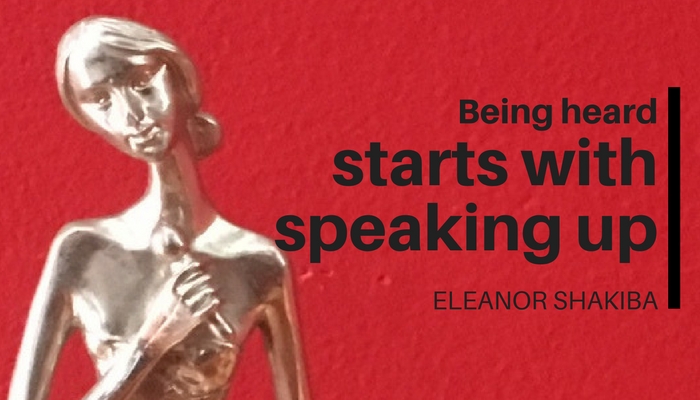Women often tell me stories of negotiations in which they gave away too much. Following these interactions, the storytellers report feeling manipulated or taken advantage of. I’ve noticed a common theme running through these stories—and it’s a theme I’m all too familiar with myself. Having too much sympathy for your counterpart can reduce your ability to hold appropriate boundaries in negotiation.
 Here’s an example from my own experience. A few years ago, I was outsourcing a writing task through a freelancing portal. The woman I selected presented as a native English speaker, with extensive experience in creating resources around the topic area. She seemed ideal. But when she supplied the first draft, I was seriously concerned. This is the point at which I should have terminated the contract. Instead, though, I did what many women do in tough situations. I tried to be nice.
Here’s an example from my own experience. A few years ago, I was outsourcing a writing task through a freelancing portal. The woman I selected presented as a native English speaker, with extensive experience in creating resources around the topic area. She seemed ideal. But when she supplied the first draft, I was seriously concerned. This is the point at which I should have terminated the contract. Instead, though, I did what many women do in tough situations. I tried to be nice.
I began creating rationalisations for the low standard of work. I told myself the supplier simply needed feedback in order to be able to provide the standard of document I required. I spent hours framing that feedback so that I wouldn’t hurt the supplier’s feelings. The second draft was no better. It was obvious the supplier had ignored my feedback. She had not addressed the topics that I had listed in my brief and her grammar, spelling and syntax suggested that she was not a native English speaker.
Instead of terminating the contract at this stage, I began negotiating. I told the supplier I was seriously concerned by the quality of the work and could not accept it. I then offered her three choices.
- Start from scratch and create the resource I required
- Go to mediation through the freelance portal
- Accept a payment of $200 and terminate the contract
I’m sure you can guess which option she chose. I ended up paying for worthless work. Later, I talked to my coach about this scenario. As he questioned me about my mental models during this situation, I realised I had placed my need for social acceptance above my need to establish firm boundaries. I was overplaying sympathy and underplaying assertiveness. This is a common theme in the stories that women in my negotiation skills courses tell. It’s likely we do this as a result of socialisation. Women have been socialised to place a high value on being liked. This results in behaviour which is so ‘nice’ that it disempowers us. My favourite book on this topic is Nice Girls Don’t Get the Corner Office.
As I reflected on my experience with the freelancer, I decided to create a checklist to ensure that I wasn’t suffering from ‘nice girl syndrome’ in future negotiations. If you’re a professional woman who wants to improve your negotiation skills, you might find this useful. It’s a checklist of the thinking habits that indicate you’re placing others’ needs above your own in a negotiation.
- You are busily imagining what the other person might feel, but you are ignoring your own feelings
- You are creating stories in your head (rationalisations) to explain or justify the other person’s behaviour, even though it makes you uncomfortable
- You are feeling guilty, ashamed or uncertain for no real reason
- The other person hasn’t told you their perspective, yet you are assuming you know what it is trying to accommodate it
- You are very concerned about how other people will see you and whether they will like you
- You’re angry, but you are not expressing this (in an appropriate way)
Use this checklist to prevent yourself from falling into unhelpful ‘nice girl syndrome’ behaviour. Of course, recognising this behaviour is simply the first step in changing your own negotiation patterns. It raises your awareness and helps you focus on how your own emotional state may be impacting your ability to negotiate logically. Developing awareness of behaviour and thinking patterns is a lifelong project. This is why I’m such a big fan of coaching. After all, if I hadn’t had a coach to discuss my situation with, I may not have generated useful learnings from the incident with the freelancer. If you’re a woman who wants to improve your communication and negotiation skills, I highly recommend regularly meeting with a coach.
Once you have awareness of limiting behavioural patterns, your next challenge will be changing these. Again, a coach or counsellor can assist in helping you do this. In general, however, I find that women need to learn how to plan strategy before embarking on tough negotiations. A plan creates a solid roadmap for the conversation. A well developed plan will cover a range of possible scenarios. This helps you to prepare for whatever reaction you get from your counterpart during a live negotiation.
Every women brings her mental models and life experiences into negotiation contexts. Learning to be an effective negotiator often involves learning how to balance processes of advocacy (speaking for yourself) and enquiry (finding out about the other person’s perspective). When you do this effectively, you will get win-win results in negotiation.
About the author of these tips
Eleanor Shakiba has dedicated her career to helping women break through glass ceilings. She is a well-known trainer and coach, who has helped more than 50,000 women build confidence, presence and influence at work. Eleanor is a lifelong learner and holds qualifications in Social Anthropology, Applied Psychology, Adult Education and Neuro Linguistic Programming.